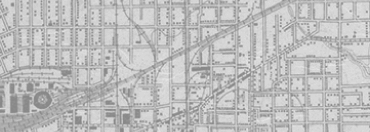


Back
Photograph of courtroom sketch of Melvin Belli and his son during Ruby trial
Photograph of courtroom pencil sketch on paper by Associated Press courtroom artist Woodi Ishmael. The sketch shows defense attorney Melvin Belli with his son Caesar during the Jack Ruby trial on February 24, 1964. The sketch shows several scenes including one of Belli and his son seated watching a film with an airplane on the screen, one of Caesar seated by himself on a bed with a toy airplane, and one of Belli holding his son in his arms. A typed caption reads:"(Advance for use with Sid Moody's APN story for AMS of Sunday, March 1) (DN13) Dallas, Tex., Feb. 24-- A Day with His Son-- This sketch by Artist Woodi Ishmael depicts scenes of Melvin Belli with a day with his son Caesar, 6. At left, Belli and his son at a Dallas movie watching Dr. Strangelove. Center, Caesar sitting on his bed in the hotel room watching TV cartoon. And right, a goodnight hug and kiss before being tucked into bed. Belli is chief defense attorney for Jack Ruby, on trial for murder (AP Wirephoto Sketch)"Ishmael's signature "Woodi Ishmael" is located in the lower left corner of the sketch. Ishmael made the original sketches for the Associated Press during the trial of Jack Ruby after the judge barred cameras from the courtroom.
Photograph of courtroom sketch of Melvin Belli and his son during Ruby trial
02/24/1964
Paper, Photo
8 1/8 × 10 in. (20.6 × 25.4 cm)
The Sixth Floor Museum at Dealey Plaza Collection
2019.026.0003
Likely the oddest sketch made during the Jack Ruby trial, this montage of scenes showing defense attorney Melvin Belli spending a day with his son, Caesar, was created by artist Woodi Ishmael specifically to accompany a feature story by longtime Associated Press writer Sid Moody (1929-2012). The film that the Bellis are watching, Stanley Kubrick's Dr. Strangelove or: How I Learned to Stop Worrying and Love the Bomb, was released nationally on January 29, 1964. Interestingly, a reference to Dallas at the climax of the film was changed to Las Vegas during editing because of the recent Kennedy assassination. Nearly five years after this sketch was made, Melvin Belli and son Caesar both appeared in an episode of the TV series Star Trek, "And the Children Shall Lead," that first aired on October 11, 1968. It was notably selected as the worst episode of the series by Spock actor Leonard Nimoy. -- Stephen Fagin, Curator
In addition to covering the Jack Ruby trial as a sketch artist for the Associated Press, artist Woodi Ishmael (1914-1995) illustrated more than thirty-five books, painted portraits of fifty-four Air Medal of Honor winners, served as artist-in-residence aboard the HMS Queen Elizabeth 2 and illustrated for a number of publications, including the Saturday Evening Post, Cosmopolitan and National Geographic. -- Stephen Fagin, Curator

Photograph of courtroom sketch of Melvin Belli and his son during Ruby trial
Photograph of courtroom pencil sketch on paper by Associated Press courtroom artist Woodi Ishmael. The sketch shows defense attorney Melvin Belli with his son Caesar during the Jack Ruby trial on February 24, 1964. The sketch shows several scenes including one of Belli and his son seated watching a film with an airplane on the screen, one of Caesar seated by himself on a bed with a toy airplane, and one of Belli holding his son in his arms. A typed caption reads:"(Advance for use with Sid Moody's APN story for AMS of Sunday, March 1) (DN13) Dallas, Tex., Feb. 24-- A Day with His Son-- This sketch by Artist Woodi Ishmael depicts scenes of Melvin Belli with a day with his son Caesar, 6. At left, Belli and his son at a Dallas movie watching Dr. Strangelove. Center, Caesar sitting on his bed in the hotel room watching TV cartoon. And right, a goodnight hug and kiss before being tucked into bed. Belli is chief defense attorney for Jack Ruby, on trial for murder (AP Wirephoto Sketch)"Ishmael's signature "Woodi Ishmael" is located in the lower left corner of the sketch. Ishmael made the original sketches for the Associated Press during the trial of Jack Ruby after the judge barred cameras from the courtroom.
Photograph of courtroom sketch of Melvin Belli and his son during Ruby trial
02/24/1964
Photographs
Jack Ruby trial
Artwork
Sketches
Artist
Ishmael, Woodi
Belli, Melvin
Associated Press (AP)
Dallas
Paper, Photo
8 1/8 × 10 in. (20.6 × 25.4 cm)
The Sixth Floor Museum at Dealey Plaza Collection
2019.026.0003
Likely the oddest sketch made during the Jack Ruby trial, this montage of scenes showing defense attorney Melvin Belli spending a day with his son, Caesar, was created by artist Woodi Ishmael specifically to accompany a feature story by longtime Associated Press writer Sid Moody (1929-2012). The film that the Bellis are watching, Stanley Kubrick's Dr. Strangelove or: How I Learned to Stop Worrying and Love the Bomb, was released nationally on January 29, 1964. Interestingly, a reference to Dallas at the climax of the film was changed to Las Vegas during editing because of the recent Kennedy assassination. Nearly five years after this sketch was made, Melvin Belli and son Caesar both appeared in an episode of the TV series Star Trek, "And the Children Shall Lead," that first aired on October 11, 1968. It was notably selected as the worst episode of the series by Spock actor Leonard Nimoy. -- Stephen Fagin, Curator
In addition to covering the Jack Ruby trial as a sketch artist for the Associated Press, artist Woodi Ishmael (1914-1995) illustrated more than thirty-five books, painted portraits of fifty-four Air Medal of Honor winners, served as artist-in-residence aboard the HMS Queen Elizabeth 2 and illustrated for a number of publications, including the Saturday Evening Post, Cosmopolitan and National Geographic. -- Stephen Fagin, Curator











